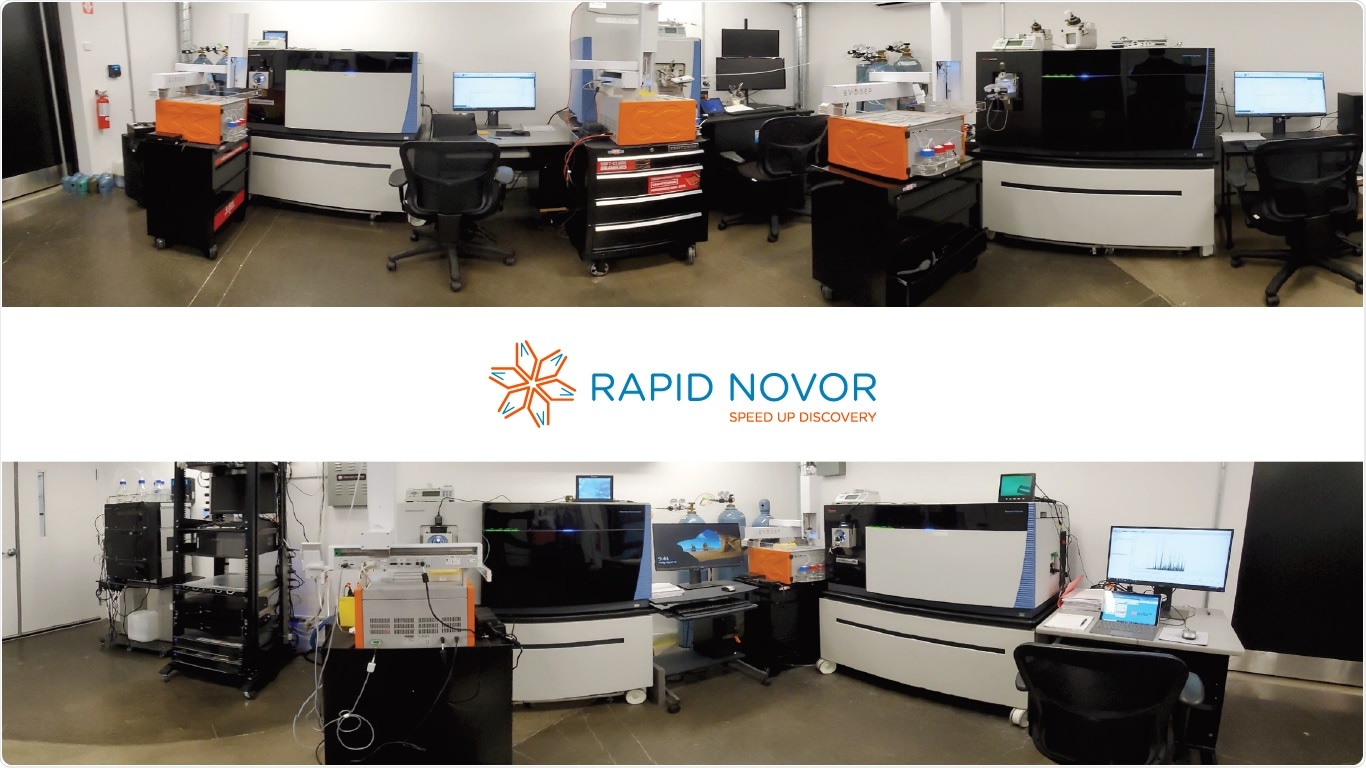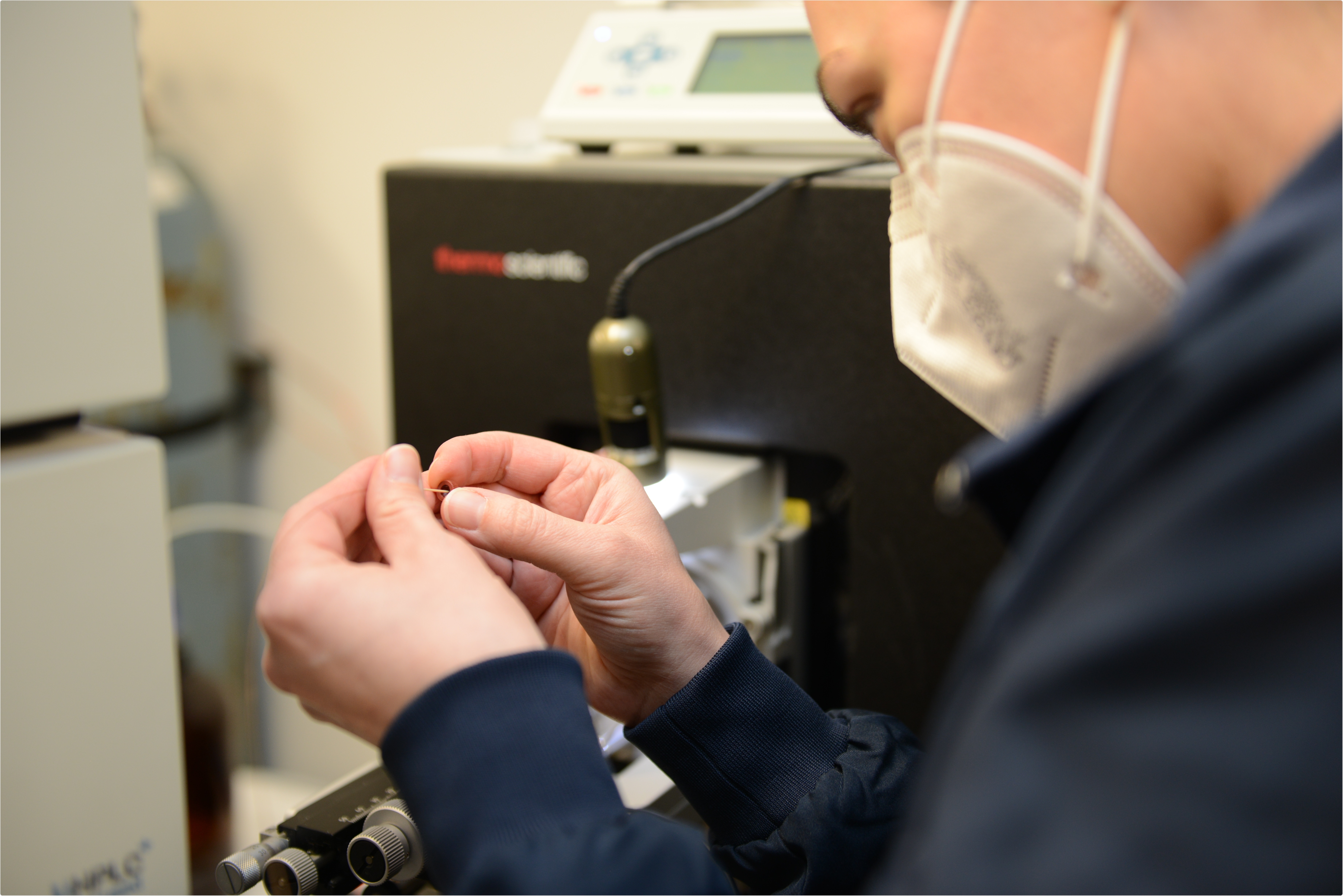In this interview, News-Medical speaks to Bin Ma, President of Rapid Novor, about their latest research that sequenced polyclonal antibodies using only proteomics.
Please can you introduce yourself and tell us about your role at Rapid Novor.
My name is Bin Ma. I am Rapid Novor’s co-founder and president. Our team at Rapid Novor has over 20 years of experience in bioinformatics, and mass spectrometry-based proteomics research and development.
Our monoclonal antibody (mAb) protein sequencing technology has successfully decoded over 3000 antibody and protein sequences from global institutions, including the top pharmaceutical companies and academic institutions.
It is this solid foundation that cemented our foothold as industry disruptors. We were the first to routinely, fully, and accurately sequence mAbs thanks to being the first to introduce WILD® (w-ion isoleucine-leucine determination), and now we are the first to sequence antibodies from a polyclonal antibody mixture without relying on nucleotide sequencing data.

Image Credit: Rapid Novor
In your latest breakthrough, you have been the first to sequence polyclonal antibodies directly from proteins using only proteomics. Why is this such a major milestone for the life sciences industry?
Our breakthrough allows scientists to tap directly into the naturally occurring, and biologically relevant circulating pool of antibodies in animal blood. Compared with other competing technologies, the turnaround time of our REpAb® Antibody Discovery method is much faster and we also find more effective and complementary antibodies.
Existing antibody discovery platforms typically require the antibody protein or the equivalent B-cell receptor (BCR) to be expressed on the surface of the antibody-producing cell. Cells are then selected according to the antibody or BCR’s affinity to the antigen. After cell selection, the DNA or RNA within the cell is sequenced. This requires the association of gene and protein at all times of the antibody discovery process, severely limiting the options for screening. Being able to sequence the proteins directly means that for the first time one can break the gene-protein association, and only need to manipulate the relevant antibody protein molecules.
Tell us about the REpAb® sequencing technology and how this sequencing was carried out?
Our REpAb® antibody discovery platform combines new proprietary advances in our de novo protein sequencing technology and protein chemistry. The seamless integration of our proprietary bioinformatics algorithms and mass spectrometry-based proteomics laboratory is what has allowed us to advance our protein sequencing technology to date.
The workflow starts with a pAb sample, or with a bleed sample after immunization. From there on, samples are affinity-purified, digested, and run through liquid chromatography-tandem mass spectrometry (LC-MS/MS). The resulting data is analyzed with our proprietary de novo protein sequencing and bioinformatics software, and evaluated by proteomics experts. Full-length antibody sequences including paired heavy-light chains are produced for subsequent recombinant expression and testing.
Why is this work so important within diagnostics and novel antibody therapeutics?
Though both are produced from immunized animals, pAb is usually easier to generate and has better avidities than mAbs. However, pAb suffers from batch-to-batch variability, making them not ideally suited for a number of important applications such as antibody drugs and in vitro diagnostics. Our technology can be used to obtain many mAb sequences from pAb samples.
The sequence information can then be used to produce a mixture of recombinant mAbs (rAbs) that have both the power of pAb and the reproducibility of mAbs. Current methods for discovering therapeutic and diagnostic antibodies do not directly target the antibody protein, and thus are limited because they may not capture the functionally important antibody repertoire.
Our technology provides a robust, shorter path to access the critical antibodies, and offers peace of mind to scientists working with pAb diagnostics by enhancing their reproducibility.
Using only proteomics to sequence means that neither cell line access nor knowledge of the DNA sequence is necessary. Why is this so beneficial in certain applications and can you give some examples?
The reason is simple: cells are much harder to access than the protein. For example, some of our clients use hybridomas to produce mAbs and have unfortunately lost the cell line due to storage problems (e.g., power outage). They usually still have a tiny amount of the antibody proteins, which can be sequenced by us to "revive" their antibodies.
To list another example, in antibody discovery after animal immunization, the antigen-specific antibody proteins circulate in the blood, whereas the cells producing these antibodies reside in the tissues and spleen, but very little to none circulate in the blood. It is so much easier to get blood than to extract cells, particularly when discovering antibodies directly from humans.
As a third example, in a blood cancer called multiple myeloma, cancer cells reside in the bone marrow, and very few to none circulate in the blood. However, they abundantly produce an antibody protein that circulates in the blood. Our ability to sequence using only proteomics allowed us to develop a noninvasive blood-based assay for monitoring multiple myeloma that is as sensitive as the invasive bone marrow-based assays.

Autoimmune Disease. Image Credit: nelzajamal/Shutterstock.com
What impacts can this antibody sequencing have in the areas of oncology, vaccinology, and autoimmune disease?
The possibilities are endless. Firstly, our technologies can help discover new antibody drugs from either immunized animals or human patients’ blood. The antibodies discovered from human blood are particularly interesting because these human antibodies are less likely to have immunogenicity when used in clinical settings, and therefore increase the safety and success rate of pharmaceutical antibody drugs.
But more importantly, in cancer, vaccine responses, and autoimmune diseases, our immune system produces antibodies against a given antigen. Sequencing these circulating antibodies reveals important information about our immune systems, allowing researchers to either diagnose a disease or assist in the treatment, as is already done with immunotherapy.
I anticipate that future treatments will rely more and more on helping our immune system to fight against diseases. Our antibody sequencing technology, after further development, will be able to provide a complete profile of the humoral immune response, which will help clinicians in their decision-making process for treatment.
In fact, we are currently using our sequencing technology to provide a non-invasive, sensitive, and accurate assay, EasyM™, for tracing the blood cancer multiple myeloma.
What impacts will this breakthrough sequencing have on the life sciences industry in general?
I foresee high-throughput de novo protein sequencing technology having as big an impact as high-throughput DNA sequencing has had on the life sciences industry. Both DNA and proteins are important molecules for life. In comparison to DNA, proteins are more directly related to disease and also contain information that DNA does not, such as post-translational modifications.
Targeting the protein directly also allows clinicians to quantify disease states. These two properties make proteins ideal biomarkers. Antibodies are a particularly important class of proteins as their binding properties make them well suited to fight diseases. Because they’re also present in large quantities in peripheral blood, sequencing them will help advance both therapeutic and biomarker discovery.
What makes your de novo protein sequencing software and mass spectrometry so advanced and reliable?
There are multiple reasons. Firstly, we have gathered a world-class multi-disciplinary team and dedicated all our R&D efforts to advance de novo protein sequencing technology. Our mission is to continue spearheading next-generation protein sequencing. Secondly, we have extensive expertise in all disciplines that are needed to make de novo protein sequencing possible.
For example, I have been conducting research in mass spectrometry-based de novo sequencing since 2000, when mass spectrometry was just gaining traction as a powerful tool for proteomics. Since then, I have developed de novo sequencing software widely used throughout academia and industry. Thirdly, our initial commercial success in the mAb sequencing service exposed us to a large number of real-life challenging antibody samples.
Through solving those challenging samples, we accumulated more and more expertise, which we have used to further advance our computer software through new algorithms and machine learning.
Landing on the Moon with Mass Spectrometry: Polyclonal Sequencing with Only Proteomics
Why should customers choose Rapid Novor?
The combination of in-house expertise and state-of-the-art software enables us to spearhead protein sequencing technology. We have over 20 years of experience in algorithm development, which has been exploited in the sequencing of over 3000 protein sequencing projects.
Many scientists have benefited from our technology by securing data for patents, advancing their R&D, and characterizing protein therapeutics, and recently obtaining sequences from a pAb-rich sample using only proteomics.
Our clients choose us because we’re leaders in our field, but also because of our customer service. Our Scientific Sales Executives help clients around the world and around the clock. Because our scientific sales executives are scientists, they have the background to understand and empower clients with the right antibody protein sequencing approach to complement their pipeline. Their dependability and approachable manner have earned us a reputation for friendly service and trustworthiness.
How is Rapid Novor planning to grow its next-generation protein sequencing technology in the coming years?
We will be exploring different applications of our sequencing technologies. Protein de novo sequencing is a brand new technology that did not exist before. In our early days, we had to spend much effort educating the market to let potential clients know about the availability of this technology. Through this process, more and more people have become aware of this technology.
In parallel, we have also found new applications of the same sequencing technology. In addition to the applications we discussed before, I foresee that scientists will continue making use of this technology in their specific applications, and even find new ways of exploiting its usefulness in future applications. We will work with our clients worldwide to meet their ever-growing needs in the use of our next-generation protein sequencing technology.

Image Credit: Rapid Novor
What is the future of antibody sequencing and how will Rapid Novor be a part of it?
I am a firm believer that every batch of antibodies needs to be sequenced to ensure its quality and reproducibility. Through our antibody sequencing technology, I see Rapid Novor becoming a key purveyor of reproducibility in the antibody production and therapeutics sectors. Additionally, ongoing and potential disease management is achieved through routine detection and monitoring of antibodies from human blood.
As the world's largest and leading de novo antibody protein sequencing company, Rapid Novor is set to meet the need for personalized healthcare, and we foresee hundreds of thousands of sequencing tasks on demand each year. Furthermore, as part of quality control for antibody therapeutics and diagnostics, I foresee hundreds of thousands of sequencing tasks will be needed every year or a few years later. Rapid Novor will empower scientists across the life science industry with sequences they can trust through our continued leadership in next-generation protein sequencing.
Does Rapid Novor have any more exciting projects in the pipeline?
Our technology has often been used in the past to verify antibody sequences as part of the quality control process in the development of therapeutics and diagnostics. With this demand in mind, we created MATCHmAbTM as a service, which we’re currently trialing with our existing client base. MATCHmAbTM will be particularly meaningful to reagent manufacturers and antibody reagent users that depend on the reproducibility of their products. With MATCHmAbTM, they can have peace of mind that the antibody they are producing or using remains the same from day to day and year to year. We welcome scientists to contact us to inquire more about this new service.
We will also apply our sequencing platform in clinical settings. As part of our commitment to bettering human health, we have exploited our protein sequencing technology to monitor relapse in multiple myeloma by tracking the M-protein biomarker and have conducted two clinical trials with excellent results to date. Our polyclonal sequencing technology will serve to advance our current efforts on this front.
Lastly, another platform that exploits our sequencing technology and which will also benefit from the proteomics breakthrough we’re discussing here is our NovorIgTM platform that quantifies the immune response. This platform is incredibly useful for vaccinology studies and even in monitoring autoimmunity.
Where can readers find more information?
Our website www.rapidnovor.com has great information for both academic and industry scientists interested in seeing how protein sequencing can benefit their research. We also suggest the following articles: Deep Dive into Immunity, and Polyclonal Antibody Sequencing for the Next Generation Antibody Discovery.
About Rapid Novor, Inc
Rapid Novor, Inc. is the world-leading antibody protein sequencing company, and home to the largest privately-funded mass spectrometry proteomics facility in Canada. Rapid Novor’s team continues to push protein sequencing boundaries with its industry-leading REmAb® platform, and now its breakthrough REpAb® antibody discovery platform, both of which can directly sequence antibody proteins without needing access to the cell line.
The team has over twenty years of experience specializing in proteomics, bioinformatics, and Big Data processing and was the first to offer a commercial solution to distinguish between isoleucine and leucine (WILD®). Rapid Novor is committed to advancing life sciences for better human health with next-generation protein sequencing.